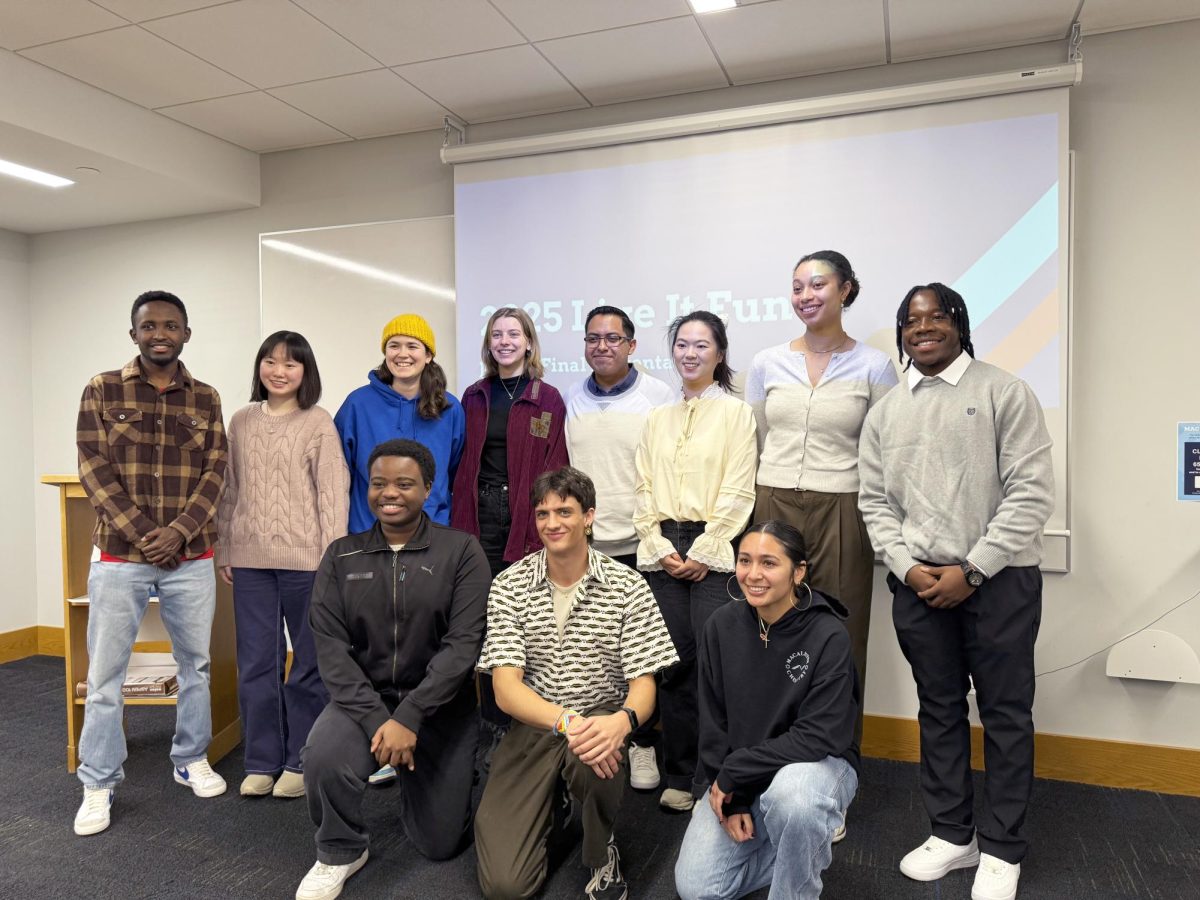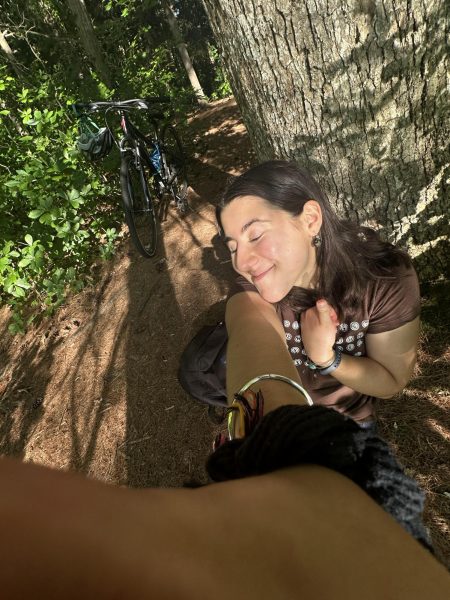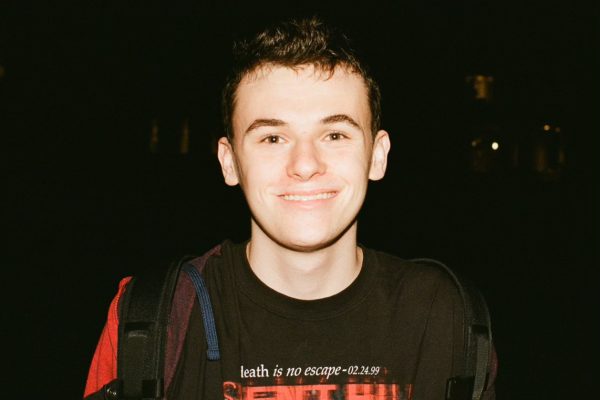On Friday, Feb. 6, the 2025 recipients of grants from Macalester’s Live It Fund gathered to present on their experiences with the fund’s January Term (J-Term) program. Each of the presenting students received up to $2,000 in grant funding to develop solutions for societal injustices that they are passionate about combating. This year, the program contributed to the creation of nine student-led entrepreneurial programs in various communities across the globe.
The Live It Fund is managed by the Department of Entrepreneurship and Innovation. According to the program’s website, the fund is intended to provide Macalester students with “funding and hands-on support in developing [and] testing”, so they can “[activate] the change they wish to see in the world.”
The students delivered their presentations in Room 250 of the DeWitt Wallace Library. Before they began, Entrepreneurship and Innovation Program Manager Erik Halaas made remarks about the J-Term Live It Fund program and his time working with this cohort of students. Halaas told the audience that he had only recently begun work at Macalester, joining the department in 2024, and that he appreciated “the energy on this campus to focus on having a deep desire to learn right, to learn more, to ask good questions, to be curious, to collaborate, to have good intention.”
“[J-Term] is a time when they could tap out … you could just be kicking your feet up,” Halaas said. “And all of these students lean into an opportunity to try to support folks outside the walls of campus, or even fellow students.”
David Manguluti ’28 delivered the first presentation of the event on his project titled “International Climate Hub.” He began by discussing the grave impact of climate change on communities across the African continent, before focusing specifically on Malawi. Manguluti told audiences that, in recent years, Malawi has been battered by climate catastrophes — a development with which the nation’s government has struggled to cope. This prompted him to think about how Malawian communities could protect themselves from climate disasters, without the need for government assistance.
Over J-Term, Manguluti traveled to Florida and met with the Miami Climate Alliance to learn about “climate risk mitigation.” He then spoke to various young people displaced by climate change. Now, Manguluti says that he is “in the reflection period and seeing what I can do as my next steps going forward in terms of research impacts.”
Next, Amandu Tu ’27 presented her J-Term project: a letter-exchange program involving Macalester students and children with autism at the Center Qing Cong Quan, a nonprofit educational organization in her home city of Shanghai. Last semester, she collected roughly fifty letters from Macalester students and faculty. During J-Term, she delivered the messages to Shanghai herself.
“If I had to choose a word to describe my feedback, I would choose love,” Tu said. “I received so [much] support and words from all three parties: the Chinese program at Macalester, the Live-It Fund and also the Center Qing Cong Quan.”
Timotei Chas ’27 then introduced his J-Term project, titled “School for Change.” He described it as “a community driven initiative to renovate the Gra Dali Public Primary School in [his] family’s ancestral village [in Côte d’Ivoire] called Doka.”
During J-Term, Chas traveled to Oume, a city near Doka, and met with local school administrators and other project stakeholders. He noted that the process of planning and preparing for interviews was “very challenging,” but “very rewarding.” But Chas said his biggest takeaway from the program was understanding “that entrepreneurship … is all about connecting with your stakeholders and understanding their needs”.
Anna Jensen ’25 and Felicia Winfrey ’25 decided to stay local for their Live-It Fund project. Jensen and Winfrey spoke about how they first met on a camping trip in northern Minnesota. The pair enjoyed this trip so much that they began to brainstorm ways to make camping more accessible to Macalester students.
Working together, Jensen and Winfrey created a zine titled “Outdoors Unlocked”. The zine includes information about various on-campus resources that students can use to minimize the cost of camping, such as the Macalester Gear Room. Jensen and Winfrey also used the zine to impart advice and lessons they have learned on their own camping trips.
Kalid Ali ’25 worked to connect the diaspora of people from Dello Mena, Ethiopia, his home district. Ali’s work focused on Germany and the UK, which are home to the most members of the Dello Mena diaspora. After discussing the best direction for the project and hosting a workshop, Ali and his collaborators created an endowment fund that supports initiatives in Dello Mena. It gets its money from a percentage of the funds people in Germany and the UK send back to Dello Mena every month. Ali hopes that this money will be a sustaining support.
Mila Zhou ’26 returned home to run a mentorship program for underserved high school students in Shanghai. The program aimed to bridge the gap between what students learn in school and the support they need to develop their careers. Zhou was inspired by the variety of students’ career aspirations — from YouTuber to attorney. As such, she extended her project goal to include weekly live check-ins, in which she offered “broader support for professional and personal growth.”
The experience shaped how Zhou views mentorship. “Mentorship is not just about experienced mentors guiding less experienced students, but mentors can learn a lot from the students as well about their resilience, about how they navigate the challenges, and even just as an interesting human being,” Zhou said.
Fabian Flores Solano ’28 worked to bridge gaps in access to economic information in his home country of Mexico. Through the program “Hablando por México,” and with help from local, national and international organizations, Flores Solano launched workshops to teach financial literacy. These workshops mostly focused on capital management, business entrepreneurship and cultural development. Their larger goal was to counter systematic underdevelopment and give communities the tools to break out of poverty.
Participants formed eight new companies. Each company is owned by Indigenous people, has five to six employees and most are women-owned.
“Now they have some money to bring back to the table,” Flores Solano said. “Now they have money to feed the children. Now they have money to give education for their own credit, for their own kids.”
In last summer’s Live It Fund program, Sabine Sullivan ’25 and Alison Harris ’25, began a project to combat racial disparities in dermatology, which they continued over J-Term. 47% of dermatologists feel that they did not receive adequate training in diagnosing and treating skin of color, Sullivan and Harris shared. Sullivan and Harris, who are both aspiring physicians and people of color, focused their project on bringing awareness to racial disparities in dermatology. They aim to increase the quality of care for BIPOC patients.
To do so, the duo developed a toolkit that includes a pen caddy that illustrates the different manifestations of psoriasis across different skin colors, infographic posters and a link to their website, shadesofinjustice.com, which provides further resources. Last summer, Sullivan and Harris developed a digital prototype of the toolkit; over J-Term, they produced and distributed physical versions to their network of primary care providers.
Ethen Kantu ’26 wrapped up the presentations, discussing his initiative to ensure clean water for residents of Mpongwe, Zambia. Kantu, who is from Lusaka, Zambia’s capital, has experience with water scarcity. At home, during summertime water scares, his water would get turned off for a day or two. However, when Kantu met a young girl named Grace, who walks four hours for water every day, he realized he didn’t know anything about water scarcity after all.
In order to help people like Grace, Kantu plans to install a borehole and train the local community to maintain it. He was not able to accomplish this goal yet because the rain made the ground too soft to drill — “rural-area logistics are going to humble you,” Kantu said — but he still plans to finish his project in the future.
“Unfortunately, Grace would have to wait a little longer before she gets that clean water access,” Kantu said. “But with the creation of the borehole, she’s only going to have to walk for less than 10 minutes to get the cleanest water inside, instead of walking for four hours, which is time she can use for something else, like going to school and also just being a kid.”
Building off Ethen’s story, Erik Halaas wrapped up the presentations by emphasizing that Live It Fund projects require flexibility.
“It’s not just about the outcome,” Halaas said. “It’s about understanding what happens when it doesn’t go as planned. And when you put your best foot forward, being willing to pivot, being willing to adapt, and understanding the realities of the space you’re operating in, and still moving forward.”
Halaas also shared that any returning students can continue their J-Term projects or start new ones in the summer Live It Fund program. Applications for this program are open through Friday, March 7.








